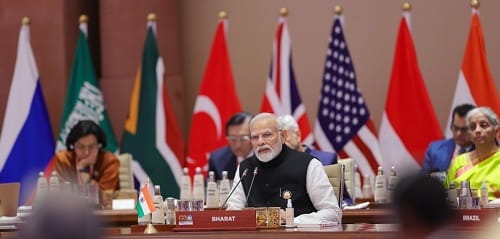As Narendra Modi embarks on his third term as Prime Minister, India’s foreign policy is poised for significant evolution, reflecting the aspirations of a nation on the cusp of becoming a global leader. Modi’s Bharatiya Janata Party (BJP), supported by its National Democratic Alliance (NDA) coalition, secured a majority, underscoring the Indian electorate’s confidence in his governance. Modi has pledged a ‘new chapter of big decisions,’ aiming to propel India towards becoming the world’s third-largest economy by 2027, among other ambitious goals. A critical aspect of this journey will be navigating the complex and multifaceted relationships with major global powers such as China, Pakistan, the United States, the Middle East, and the Ukraine-Russia conflict.
Indo-China Relations
India’s relationship with China will be a focal point in Modi’s third term, characterized by strategic recalibration and enhanced defense preparedness. The ongoing tensions along the Himalayan border necessitate a robust response, including significant investments in border infrastructure and military readiness. The deployment of Chinese advanced military assets close to Indian territories requires a vigilant and proactive stance.
Expect India to continue deepening its alliances through minilateral arrangements like the Quad, comprising the United States, Japan, and Australia, to counterbalance China’s influence in the Indo-Pacific. Economically, India will aim to reduce dependency on Chinese imports by bolstering its “Make in India” initiative and diversifying supply chains. Diplomatic channels will remain open, with efforts to de-escalate tensions through dialogue while firmly asserting India’s territorial integrity.
Indo-Pak Relations
Indo-Pak relations remain one of the most challenging aspects of India’s foreign policy, primarily due to the persistent issue of cross-border terrorism and the Kashmir dispute. Modi’s administration will maintain a zero-tolerance policy towards terrorism, ensuring national security is paramount. Diplomatic efforts will focus on isolating Pakistan globally while seeking to counter its influence through regional security collaborations, such as the Colombo Security Conclave.
Significant breakthroughs in bilateral relations are unlikely, given the internal political dynamics in Pakistan, dominated by military influence. Nonetheless, Modi’s government will continue to advocate for peace and stability in the region while being prepared for any security contingencies.
Indo-US Relations
The strategic partnership between India and the United States is set to deepen further, building on the strong foundation laid in previous years. Modi’s third term will see enhanced cooperation across multiple domains, including defense, technology, trade, and people-to-people ties. The Initiative on Critical and Emerging Technology exemplifies the forward-looking approach in bilateral relations.
Defense collaboration will intensify, with more joint military exercises and technology transfers. The space sector, digital infrastructure, and energy transition will be key focus areas, aligning with the strategic interests of both nations. Economically, efforts will be made to finalize a comprehensive trade agreement, boosting bilateral investment and trade.
Strategically, the US-India partnership will play a pivotal role in regional security, particularly in the Indo-Pacific, to counterbalance China’s influence. The partnership’s growth reflects India’s broader goal of cementing its status as a global leader and a key player in world politics.
Indo-Middle East Relations
India’s relationship with the Middle East is crucial, given the region’s importance for energy security, trade, and the large Indian diaspora. Modi’s third term will focus on deepening ties with key Gulf Cooperation Council (GCC) countries, enhancing cooperation in energy, infrastructure, and technology sectors.
Expect increased investments from the Middle East in India’s infrastructure projects, bolstering economic ties. Additionally, India will seek to play a more prominent role in regional security and counterterrorism efforts, working closely with Middle Eastern nations to ensure stability and peace in the region. Strengthening cultural and people-to-people exchanges will also be a priority, further solidifying the robust ties between India and the Middle East.
Ukraine-Russia Conflict
The Ukraine-Russia conflict presents a complex challenge for India, balancing its longstanding relationship with Russia and its strategic ties with Western nations. Modi’s government will continue to navigate this delicate situation with a pragmatic approach, emphasizing dialogue and diplomacy to resolve the conflict.
India will maintain its defense and trade ties with Russia, recognizing Moscow’s role in India’s strategic calculus. However, Delhi will also advocate for a peaceful resolution to the conflict, urging respect for international law and sovereignty. India’s position will likely involve supporting humanitarian efforts and promoting diplomatic initiatives to de-escalate tensions, reflecting its commitment to global peace and stability.
To conclude, it would be fair to say that Modi’s third term is poised to drive comprehensive foreign policy reforms, strengthen strategic alliances, and solidify India’s leadership role on the global stage. By enhancing regional security, pursuing permanent membership in the United Nations Security Council, and fostering global partnerships, India aims to emerge as a pivotal player in world affairs. The vision of a ‘Developed India’ by 2047, propelled by market reforms, economic resilience, and strategic diplomacy, will guide the nation’s journey in the coming years.
Best Regards,
Dr. (H) Avi Verma
Publisher, IndoUS Tribune
